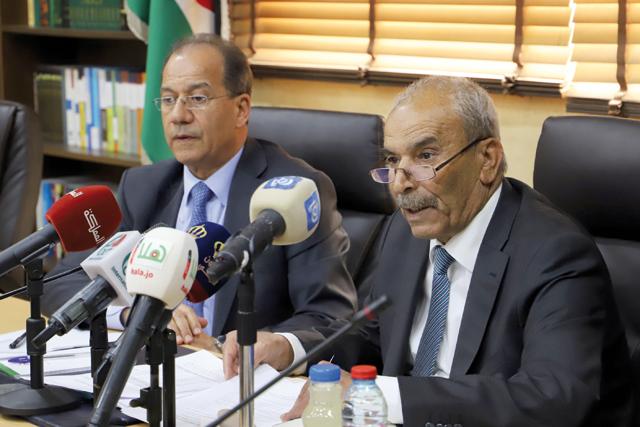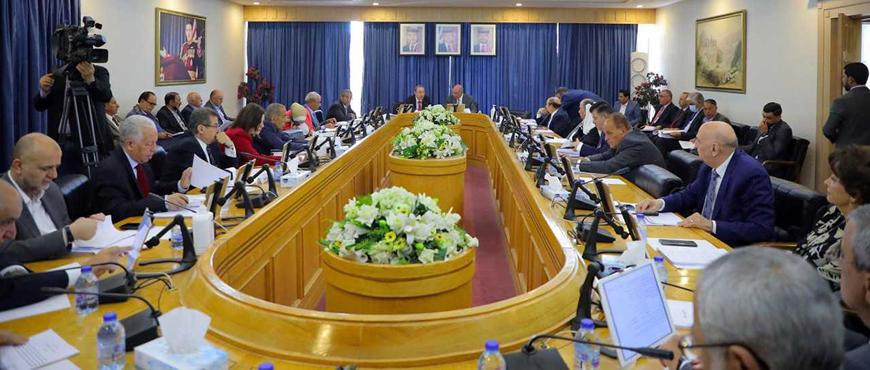You are here
Penal Code amendments bring in alternative punishments to protect society — justice minister
By Rana Husseini - May 11,2022 - Last updated at May 11,2022

Justice Minister Ahmad Ziadat speaks during a press conference along with Minister of State for Media Affairs Faisal Shboul in Amman on Tuesday (Petra photo)
AMMAN — Justice Minister Ahmad Ziadat on Tuesday said that the recently endorsed amendments to the Jordanian Penal Code (JPL) by Parliament were aimed at protecting society and introducing new or alternative punishments that did not exist in the law.
“There are many developments that took place in the past three decades that were not reflected in the JPL,” Ziadat told reporters during a joint press conference with Minister of State for Media Affairs Faisal Shboul.
That is why, Ziadat added, the government introduced new articles, amended some sections or added new clauses to address some violations or crimes that were not included.
“We aim to spread the culture of forgiveness, reconciliation and community service among our citizens,” Ziadat stressed during the press conference.
One of the important additions, according to Ziadat, was the introduction of the “alternative penalties” for petty crimes in which the judge shall implement one or more alternatives to deprivation-of-liberty penalties (for non-repeaters), based on a social status report, under the supervision of the Justice Ministry.
“The aim is to give offenders, in petty crimes who are not repeat convicts, a chance to continue their lives by serving the community instead of being imprisoned with other individuals who have committed major crimes,” the minister told reporters.
The alternatives include community service (40-100 hours), enrolment in a behavioural rehabilitation programme, forms of electronic surveillance for one month to a year, as well as denied access to certain places for one month to a year, the minister explained.
The minister also said that the law included introducing the electronic bracelet, which could be used as an alternative solution instead of imprisoning people.
“This would give individuals such as farmers or students the chance to be able to continue their education or work while abiding by the electronic bracelet,” according to Ziadat.
Touching on the endorsements made to Article 339 concerning punishments for attempted suicide, the minister stressed that such laws exist in other countries and are meant to protect individuals and society as a whole.
The minister added that “attempting to commit suicide in public areas could cause fear or chaos in society or can have “a major psychological impact on children or teenagers who might live with trauma or attempt to imitate this harmful act”.
“We also want to help these individuals by offering them psychological or other forms of services to help them if it is proven that they were mentally disturbed,” Ziadat said.
Meanwhile, the minister revealed that there are some 150,000 individuals who are imprisoned for issuing bad cheques, including 82,000 per cent whose debts are less than JD5,000.
That is why, Ziadat said, “the government decided to lift imprisonment penalties for issuing bad cheques if the amount was less than JD5,000.
The idea is to ensure the availability of credit alternatives when penal protection for cheques is lifted after three years, Media Minister Shboul said.
After three years of entering into force, the two draft laws would stop the criminalisation of issuing a cheque without balance (bad cheques) and prevent the imprisonment of the debtor who is unable to fulfil a contractual obligation if the amount awarded is less than JD5,000, according to Shboul.
Ziadat also touched on stiffening the punishment for vagrancy, as beggars shall face an imprisonment term of no less than three months, while those who exploit others in begging shall face imprisonment of no less than two years.
Regarding offences linked to drunken violence, the perpetrator shall face an imprisonment term of no less than three months and a fine of no less than JD100, as per the approved amendments, according to Ziadat.
Related Articles
AMMAN — Jordanian courts have implemented 48 of 109 alternative sentences issued to defendants in September, the Justice Ministry said on Tu
AMMAN — The Senate’s Legal Committee on Sunday approved the draft law amending the Execution Law as referred to by the Lower House, the Jord
AMMAN — The Lower House on Tuesday, while deliberating amendments to the Penal Code, agreed to lift imprisonment penalties for issuing bad c


















